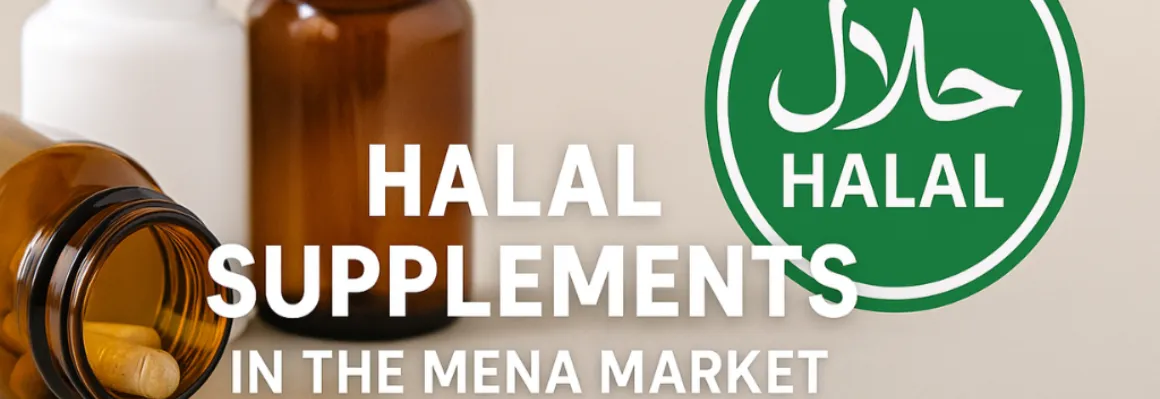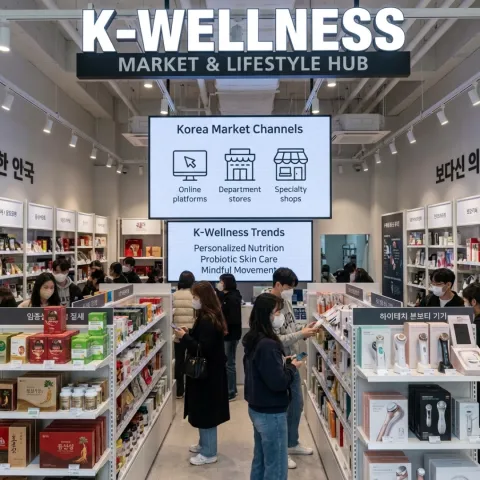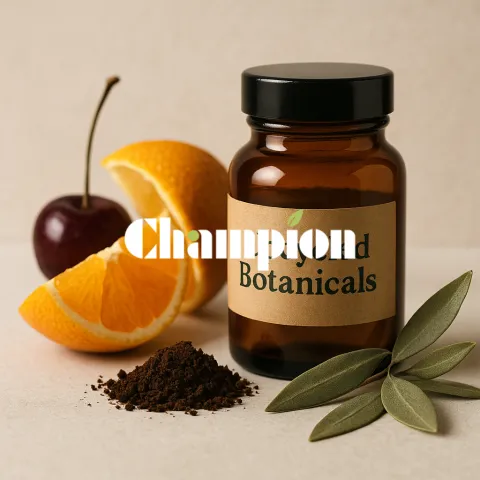Blog
16.Oct.2025
Spotlight on the Gulf: Halal Supplements and the MENA Consumer

Introduction
Demand for halal supplements in the MENA region is entering an unprecedented growth phase. With a rising Muslim population, stricter regulatory climates, and a consumer base seeking ethical, trustworthy products, the Gulf and broader Middle East have become global epicenters for halal-certified nutraceuticals and dietary supplements. For brands and contract manufacturers, mastering certification and consumer-driven innovation is now a prerequisite for success.MENA Halal Supplement Market: Size, Growth, and Opportunity
- The global halal-certified supplement market hit $6.27 billion in 2025, expected to reach $16.65 billion by 2034 (10%+ CAGR).
- The GCC dietary supplement market alone stands at $1.72 billion (2024), projected to nearly double by 2030 led by Saudi Arabia, UAE, and Qatar.
- Most Gulf consumers now expect explicit halal certification—while brands report a 40–60% increase in premium pricing tolerance for certified vs. non-certified products.
- Plant-based, clean-label, and functional blends are increasingly popular alongside traditional vitamin/mineral formulations.
Halal Certification: Gulf Regulatory Essentials
What Does Halal Certification Involve for Supplements?
- Ingredient Control: All raw materials must be free of haram (forbidden) substances—no pork, alcohol, or non-compliant animal derivatives (e.g., standard gelatin).
- Manufacturing Standards: Halal facilities require dedicated production lines, rigorous sanitation, and prevention of cross-contamination with non-halal materials.
- Animal-derived Ingredients: Must be slaughtered by a Muslim, in the name of Allah, and certified by recognized halal authorities.freyrsolutions
- Documentation and Traceability: Suppliers must provide certificates for every ingredient batch, and end-to-end traceability is required.
Gulf-Specific Requirements
- UAE: Regulated by MoIAT, ESMA, and the Halal National Mark. Standards such as UAE.S 2055-2 focus on food and dietary supplement compliance.
- Saudi Arabia: SFDA and GAC enforce strict animal-origin ingredient rules and now require retail supplements to have halal documentation.
- Certification Bodies: ESMA, GAC, JAKIM (Malaysia), IHAF, and occasionally global partners like IFANCA are recognized.
Certification Process Overview
- Ingredient sourcing: All ingredients pre-vetted for halal status, with certificates from producers.
- Manufacturing audit: Facility inspections verify sanitation, separation, and standards compliance.
- Slaughtering verification (if animal-derived): Documented halal slaughter in accordance with Islamic law.
- Label approval: Clear halal logo, Arabic labeling, and regulatory submission.
- Ongoing audits: Annual inspection and batch-level testing for continued compliance
MENA Consumer Preferences: What Muslim Shoppers Demand in Supplements
- Full Transparency: Labels must identify sources, state halal status, and carry certification marks. MENA consumers actively avoid vague or self-declared halal claims.
- Plant-Based & Clean-Label: Younger Gulf buyers (Millennials, Gen Z) prefer supplements that are both halal and plant-based, shunning animal derivatives even if compliant, and seeking organic, non-GMO, or low-sugar attributes.finance.
- Heritage and Functionality: Formulas enhanced with regional botanicals—like black seed, dates, ajwa, saffron, or honey—are in high demand, combining tradition with modern science.
- Health-Driven Choices: Immunity, energy, metabolic health, beauty-from-within, and prenatal supplements are top categories. Many shoppers are willing to pay a premium for evidence-backed blends supporting diabetes or heart health, key regional health concerns.
- Digital Discovery: Gulf consumers use e-commerce platforms, social channels (Instagram, Snapchat, TikTok), and online pharmacies to research and buy supplements, especially post-pandemic.
Distribution Trends: Pharmacies, E-Commerce, and Beyond
- Pharmacies: Over 60% of supplement sales still take place in regulated pharmacies, but this is changing quickly.
- E-Commerce: Urban buyers increasingly prefer online marketplaces, digital pharmacy chains, and influencer-led launches, especially for imported, premium, or specialty halal supplements.
- Grocery/Supermarket: Chains like Carrefour, Lulu, and Tamimi are expanding halal wellness aisles, responding to growing cross-generational demand.
- Education & Trust: In-store halal labeling, digital badges, and influencer partnerships are integral to raising awareness and accelerating adoption.
Market Entry & Compliance Checklist
| Market | Certifier(s) | Key Local Requirements | Renewal/Audit |
| UAE | MoIAT, ESMA, GAC | Halal National Mark, plant-based preference, Arabic label | Annual/Batch |
| Saudi Arabia | SFDA, GAC, ESMA | Halal cert + audit, animal source control, retail reg. | Annual/Batch |
| GCC (Global) | GAC, IHAF, JAKIM | Unified standards, certificate, halal logo required | Annual/Per Batch |
Trends Reshaping the Halal Supplement Market
- Mandatory Halal Labeling: From 2023, KSA/UAE require visible halal certification for any supplement sold through registered channels—pharmacies, e-commerce, and big retail.
- Rise of Vegan & Ethical Consumerism: Plant-based halal supplements, including capsules and gummies, are seeing 20–30% annual growth, appealing to Muslims and non-Muslims.
- Local Innovation: Regional brands are integrating local superfoods (e.g., dates, zamzam, black cumin) to differentiate and connect culturally.
- Premiumization: Clean-label, innovative delivery formats (fast-dissolve, sachets) and science-backed claims command higher price points, especially with international certification partners.
Regulatory & Supply Chain Pitfalls
- Key risks: Cross-contamination, incomplete documentation, use of non-halal animal ingredients, import delays due to certification disputes.
- Best practice: Partner with recognized local agencies and maintain digital document management for each shipment and batch.
Expert Insights & Industry Quotes
- "Halal certification is not just a legal hurdle—it’s a trust contract with the Gulf consumer. Brands who cut corners or mislabel will be noticed and rejected by a hyper-informed, mobile-first market."— Regulatory Affairs Specialist, GCC
- "Gulf Millennials want authenticity—they’re willing to pay more for halal supplements with clean labels, regional botanicals, and transparent certification."— Supplement Brand Manager
Frequently Asked Questions
Q: Is halal certification mandatory for all supplements in the MENA/Gulf?A: Yes, for all retail and e-commerce sales in the leading GCC markets (Saudi, UAE, Qatar, Oman), certification by a recognized local or regional body is now required.
Q: Which supplement categories are selling fastest?
A: Immunity, prenatal, beauty-from-within, and functional blends (e.g., gut health, metabolic) lead in volume and growth, especially where plant-based and science-backed.
Q: Can global brands use international halal certs?
A: It depends—global certs are valid if recognized by ESMA or SFDA, but cross-check for accepted agency lists and prepare for local audits.
Q: Which mistakes get products banned or recalled?
A: Non-halal gelatin, missing documentation, no Arabic on the label, and ingredient cross-contamination.
Conclusion
Winning in the booming MENA halal supplement space takes rigorous certification, on-point branding, and profound respect for increasingly sophisticated consumer expectations. Gulf buyers want ethical, transparent, and science-backed wellness brands that honor faith and cultural identity, both on the label and in the supply chain.Ready to expand?
Connect with a trusted certification expert or local regulatory advisor and start building loyalty among MENA’s next generation of halal supplement consumers



















